Internal pudendal artery
The internal pudendal artery is one of the three pudendal arteries. It branches off the internal iliac artery, and provides blood to the external genitalia.
| Internal pudendal artery | |
|---|---|
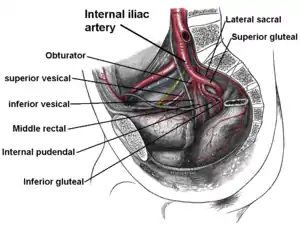 Internal iliac artery with branches, including internal pudendal artery. | |
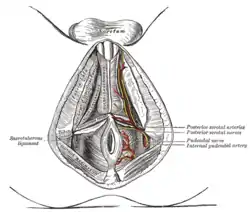 The superficial branches of the internal pudendal artery. | |
| Details | |
| Source | internal iliac artery |
| Vein | Internal pudendal veins |
| Supplies | external genitalia, perineum |
| Identifiers | |
| Latin | arteria pudenda interna |
| TA98 | A12.2.15.038 |
| TA2 | 4341 |
| FMA | 18835 |
| Anatomical terminology | |
Structure
The internal pudendal artery is the terminal branch of the anterior trunk of the internal iliac artery.[1] It is smaller in the female than in the male.
Path
It arises from the anterior division of internal iliac artery. It runs on the lateral pelvic wall. It exits the pelvic cavity through the greater sciatic foramen, inferior to the piriformis muscle, to enter the gluteal region.
It then curves around the sacrospinous ligament to enter the perineum through the lesser sciatic foramen.
It travels through the pudendal canal with the internal pudendal veins and the pudendal nerve.
Branches
The internal pudendal artery gives off the following branches:
| In females | In males | Description |
|---|---|---|
| Inferior rectal artery | Inferior rectal artery | to anal canal |
| Perineal artery | Perineal artery | supplies transversus perinei superficialis muscle |
| Posterior labial branches | Posterior scrotal branches | - |
| Artery of bulb of vestibule | Artery of bulb of penis[1] | supplies bulb of vestibule/bulb of penis |
| Dorsal artery of clitoris | Dorsal artery of the penis[1] | - |
| Deep artery of clitoris | Deep artery of the penis[1] | to corpus cavernosum penis |
The deep artery of clitoris is a branch of the internal pudendal artery and supplies the clitoral crura. Another branch of the internal pudendal artery is the dorsal artery of clitoris.
Some sources consider the urethral artery a direct branch of the internal pudendal artery,[2] while others consider it a branch of the perineal artery.
In males, the internal pudendal artery also gives rise to the perforating arteries of the penis.[1]
Variation
Around 70% of men have an accessory internal pudendal artery.[1] This usually does not originate from the internal iliac artery, instead originating from the external iliac artery, the obturator artery, or the vesical arteries.[1]
Function
The internal pudendal artery supplies blood to the external genitalia.
Clinical significance
In women, the internal pudendal artery may be damaged during childbirth.[3] This may cause a haematoma, which usually resolves without treatment, but may form an infected abscess.[3]
Additional images
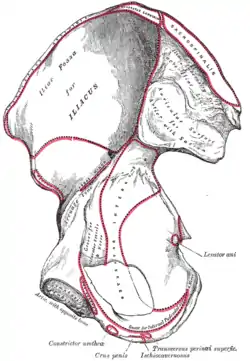 Right hip bone. Internal surface.
Right hip bone. Internal surface.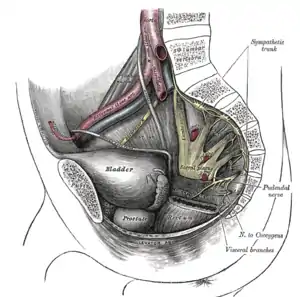 Dissection of side wall of pelvis showing sacral and pudendal plexuses.
Dissection of side wall of pelvis showing sacral and pudendal plexuses.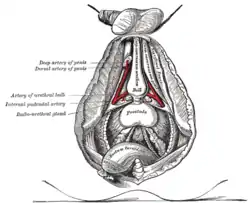 The deeper branches of the internal pudendal artery.
The deeper branches of the internal pudendal artery.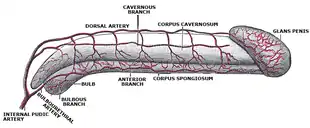 Diagram of the arteries of the penis.
Diagram of the arteries of the penis.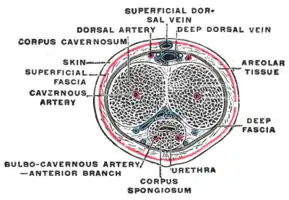 The penis in transverse section, showing the bloodvessels.
The penis in transverse section, showing the bloodvessels. Internal pudental artery.Deep dissection. Lateral view.
Internal pudental artery.Deep dissection. Lateral view.
References
- Keegan, Kirk A.; Penson, David F. (2013-01-01), Creager, Mark A.; Beckman, Joshua A.; Loscalzo, Joseph (eds.), "Chapter 28 - Vasculogenic Erectile Dysfunction", Vascular Medicine: A Companion to Braunwald's Heart Disease (Second Edition), Philadelphia: W.B. Saunders, pp. 341–348, ISBN 978-1-4377-2930-6, retrieved 2021-01-14
- "Internal pudendal artery" at Dorland's Medical Dictionary
- Gilbert, Robert O.; Cable, Christina; Fubini, Susan L.; Steiner, Adrian (2017-01-01), Fubini, Susan L.; Ducharme, Norm G. (eds.), "Chapter 16 - Surgery of the Bovine Reproductive System and Urinary Tract", Farm Animal Surgery (Second Edition), W.B. Saunders, pp. 439–503, ISBN 978-0-323-31665-1, retrieved 2021-01-14
External links
- Anatomy figure: 41:04-00 at Human Anatomy Online, SUNY Downstate Medical Center - "Inferior view of female perineum, branches of the internal pudendal artery."
- Anatomy figure: 41:04-06 at Human Anatomy Online, SUNY Downstate Medical Center - "Inferior view of female perineum, branches of the internal pudendal artery."
- Anatomy figure: 42:03-01 at Human Anatomy Online, SUNY Downstate Medical Center - "Branches of internal pudendal artery in the male perineum."
- Anatomy figure: 43:07-14 at Human Anatomy Online, SUNY Downstate Medical Center - "Sagittal view of the internal iliac artery and its branches in the female pelvis. "
- Anatomy figure: 44:06-00 at Human Anatomy Online, SUNY Downstate Medical Center - "Sagittal view of the internal iliac artery and its branches in the male pelvis. "
- Anatomy image:9086 at the SUNY Downstate Medical Center
- MedicalMnemonics.com: 2503
- pelvis at The Anatomy Lesson by Wesley Norman (Georgetown University) (pelvicarteries)
- figures/chapter_32/32-2.HTM: Basic Human Anatomy at Dartmouth Medical School
- figures/chapter_32/32-3.HTM: Basic Human Anatomy at Dartmouth Medical School
- Diagram at MSU